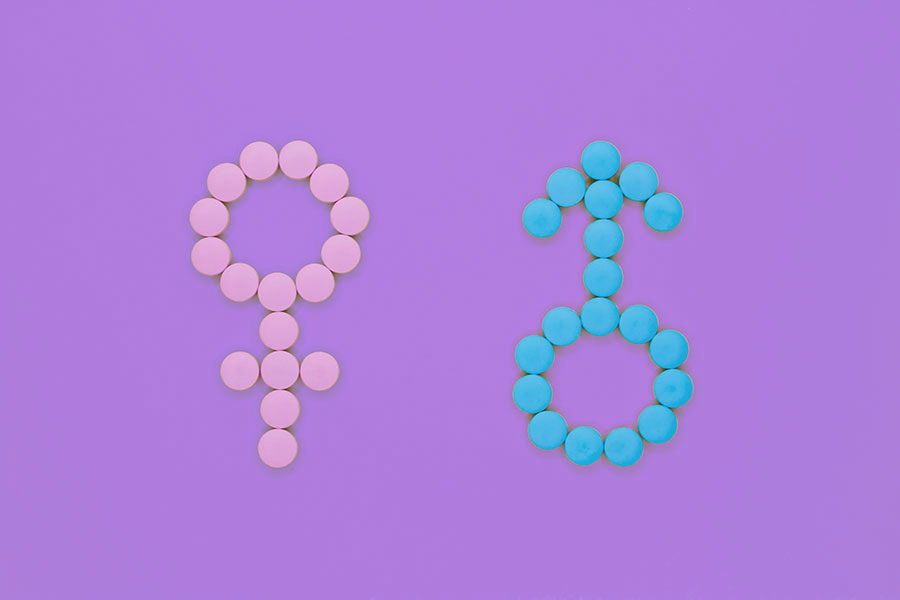Everything you need to know about sex hormones

Hormones are chemical messages transported in the bloodstream from the glands to the target organs, telling them how to act. They include thyroid hormones that govern your metabolism, and insulin, that tells your cells to take up sugars from your blood.
And, of course, they include the sex hormones such as oestrogen, progesterone and testosterone, which govern fertility, the development of sexual characteristics and the menstrual cycle.
Hormones, in fact, affect every part of our lives, including whether we feel tired, how hungry we are, our libido, bone density, body temperature and whether we feel relaxed or stressed. They all interact with each other and many factors can upset this delicate balance.
Stress
Being stressed causes an increase in the hormone cortisol, which directly affects body and mind by, for example, stimulating cravings for sugary foods. It also has a knock-on effect on other hormones, by decreasing testosterone and progesterone. So, stress can affect fertility, lead to low testosterone in men, and disrupt the menstrual cycle and contribute to PMS in women.
Chemicals
Hormone-disrupting chemicals are extremely difficult to avoid, explains Dr Marilyn Glenville, nutritionist and women’s health expert.
‘Xenoestrogens are oestrogen-like chemicals from pesticides or plastics,’ she says. ‘Their rise in our environment has coincided with an earlier onset of puberty from age 15 at the turn of the century to as early as age eight and they may even be linked with causing breast cancer.
To keep your hormones healthy it’s important to reduce your exposure to xenoestrogens as much as possible.’ As well as in plastics and pesticides, similar chemicals can be found in personal care products, detergents and glues, among others.
Obesity
Body fat is not an inactive substance. In fact, fatty tissue produces an enzyme called aromatase, which triggers the conversion of androgens (‘male’ hormones including testosterone) into oestrogen. Both men and women need this enzyme – and we all make it – but those who have a high level of body fat may end up with too much, resulting in excess oestrogen.
In men, this may contribute to muscle loss, low sex drive, and gynaecomastia (‘man boobs’). In women, the most obvious consequences are PMS, heavy periods and lumpy breasts.
Diet
High-GI (glycaemic index) foods, including most processed foods and anything made with white refined flour such as white breads and standard pasta, increase the glucose in the bloodstream, which triggers a spike in insulin. Insulin is itself a hormone and when it’s frequently at high levels, can have an impact on other hormones – including testosterone.
Our body needs a variety of nutrients to make and break down hormones. Healthy fats are needed to make the sex hormones, as
well as cortisol.
Protein is needed to make the thyroid hormone, and is vital for proper detoxification and to break down hormones in general. Many other vitamins and minerals, including B vitamins, zinc and magnesium, also play a role. So if you’re lacking any of these, it can start to upset the balance.
Lack of sleep
The most obvious link between sleep and hormones is with testosterone in men. As Matt Lovell, elite sports nutritionist and men’s health expert, explains: ‘The peak time for testosterone production in men is between 4-6am, so lack of sleep – or poor-quality sleep – can reduce testosterone levels.’
Chronic poor sleep can also affect blood sugar balance and insulin sensitivity, and may contribute to weight gain.
Excessive exercise
Overtraining is another stress on the body. This may be a particular problem in men, as high cortisol means low testosterone. In women, it can happen when body fat falls too low, generally because calorie intake doesn’t match training needs.
As Dr Glenville explains, ‘exercise without the correct intake of food can reduce your body fat percentage to a level where menstruation ceases’. This in turn affects fertility, and can affect bone density due to low oestrogen levels.
A sluggish system
The liver plays a primary role in getting rid of ‘used’ or excess hormones. Alcohol has the most obvious negative impact on our liver.
After the liver has broken down the excess hormones, the waste substances are sent into the gut via the bile, to be excreted. Fibre in our diet has two roles here: it binds to those hormone remnants and stops them being reabsorbed into the body and it encourages healthy and regular bowel movements.
7 ways to get your hormones in check
- Avoid processed & high GI foods: Focus on ‘real’ foods with plenty of vegetables, key for healthy blood sugar levels and getting all the nutrients you need.
- Go organic: Especially important with regards to animal foods, to avoid any hormones given to conventionally-raised animals.
- Prioritise sleep: For men in particular, get 8 to 10 hours’ sleep a night for healthy testosterone levels and to manage stress.
- Don’t heat food in plastic: Those hormone-disrupting chemicals are more likely to leach into your food when it’s hot and in contact with plastic.
- Choose natural alternatives: For personal care and household products, avoid chemicals like parabens and synthetic fragrances.
- Re-evaluate your exercise: Try focusing more on weight training to help reduce the release of stress hormones.
- Try hormone-balancing herbs: Ayurvedic doctors have for centuries recommended Shatavari as a natural solution to help regulate the menstrual cycle, ease PMS and enhance fertility. Ashwagandha is another herb that works well for both sexes, balancing out the effects of stress.












